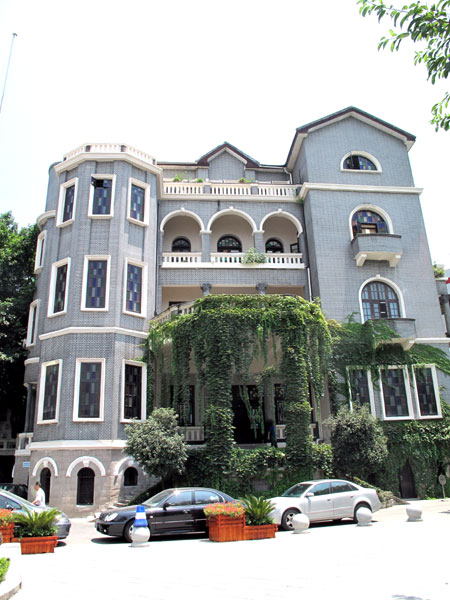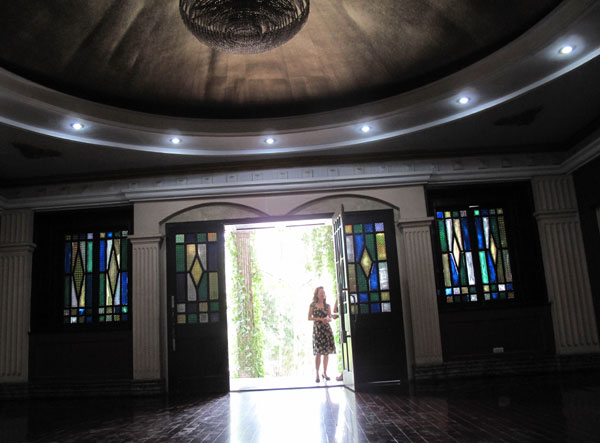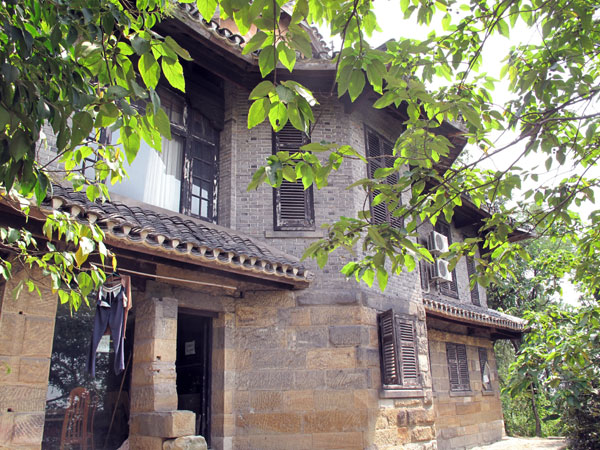

 |
|
The administrative office of the Third People's Hospital of Chongqing was once the embassy of the Soviet Union in the city. Photos by Luo Wangshu / China Daily |
 |
|
The hallway of the administrative office of the Third People's Hospital of Chongqing. |
 |
|
The former Germany embassy, which is now private real estate. |
Historical buildings serve as reminders of a crucial time in history, Luo Wangshu and Tan Yingzi report in Chongqing
Temperatures of 40 C were pushing the mercury to the top of the thermometer, heating up the old four-story building, which has a history as torrid as any scorching summer day.
The quiet house, ivy clinging to the walls and porch, is located on a hilltop in the southwestern municipality of Chongqing, the wartime capital of China. It now serves as the administrative center of the Third People's Hospital of Chongqing, but during World War II the plain building was the Soviet embassy.
"This building may have been the birthplace of many important decisions that shaped the world during the war, and it may also have hosted world leaders," said Wang Fumei, director of the hospital's cultural affairs office, who has worked in the building for nearly 30 years.
Many countries established diplomatic centers in Chongqing during wartime, playing a critical role in the Asian theater of war. However, the history of these sites was rarely mentioned until five years ago when people started to seek out and cherish wartime truths through Chongqing's living history.
The sites, which are mainly scattered around downtown districts such as Yuzhong and Nan'an, have changed their functions in the post-1945 world.
The former United States embassy became the administrative center and dining room of the Chongqing Emergency Medical Center. The British embassy, as was, is privately owned and has been leased to a resort company. What was once the Italian embassy, its walls cracked and crisscrossed by electric cabling, is home to six families. The former office of the Indian prefectural commissioner, located in the Nanshan Botanical Gardens, now serves as a public library.
In the aftermath of that global conflict, these sites fell into disrepair, their facades dilapidated and uncared for, the grounds overgrown and tangled with weeds.
Cultural heritage
Now though, these historic sites are finally getting the recognition they deserve. In July, 13 of Chongqing's wartime diplomatic centers were selected as National Archeological Sites, with the aim of better protecting and preserving China's cultural heritage.
In a 2010 proposal, Huang Jiren, a Chongqing writer and a member of the Chinese People's Political Consultative Conference, appealed to the State to protect Chongqing's wartime heritage.
The central government is now paying great attention to the preservation of the wartime heritage. Chongqing, home to many wartime treasures, is also on a mission to protect and preserve its heritage. An international conference themed "The War of Resistance against Japanese Aggression during World War II", will be held in Chongqing next month and a number of international authorities on the conflict will attend.
In the past two years, the Sino-Japanese relationship has become even more complicated because of the Diaoyu Islands issue, which has attracted greater global attention to the history of the war in China, said Zhou Yong, director of the Chongqing Research Center for War of Resistance against Japanese Aggression in the Unoccupied Area, which collates and protects historical materials relating to the period when parts of China were occupied.
"These embassy sites are reminders of a time - past, but not long past - when China was part of a global struggle against the forces of fascism and imperialism. China's war with Japan was part of a wider international conflict and the embassies remind us of that time," Rana Mitter, professor of the history and politics of modern China at Oxford University's Institute for Chinese Studies, wrote in an e-mail to China Daily.
When the Kuomintang government of Chiang Kai-shek established Chongqing as China's capital in 1937, the Soviet Union was the first country to hand in a request to set up an embassy in the wartime capital. The Soviet move was swiftly followed by similar requests from more than 30 countries.
However, these once glorious sites, awash with history, have become hospitals, libraries, museums and even private residences, serving the lives of ordinary people.
Wang, 50, began working as an administrative assistant at the site of the former Soviet embassy in 1982. Climbing the wooden stairs to her fourth-floor office is like taking a trip 75 years into the past, to a time when the building was full of diplomats and intrigue.
The four-story building, with 56 rooms spread over its 488.8 square meters of floor space, was used as a clinic and wards in the immediate postwar era.
"The rooms were not the same shape as regular hospital wards and so the building's function was changed and it became an administrative center," said Wang.
For Wan Xin, a 23-year-old member of the administrative staff, the building is her workplace, but it also holds happy memories from her childhood when she spent her days playing in the grounds.
"The ceilings are higher than those in other buildings," said Wan, whose mother has worked at the hospital since Wan was a child.
Although the facade has been altered slightly and the interior remodeled, the former Soviet embassy has generally been preserved well.
Sadly, the same can't be said for the former US embassy, situated just a five-minute drive away. The building was torn down in 2007 and is now being rebuilt in accordance with the original plans, but with upgraded materials and facilities.
Wu Yang, deputy director of the Chongqing Emergency Medical Center's general office, said the embassy will be restored to its original appearance.